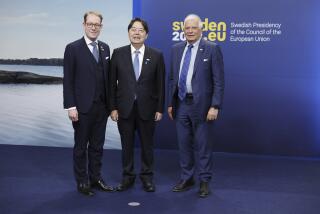Japan Lauded for Iraq Involvement
- Share via
TOKYO — Japan and other nations sending troops to Iraq need to prepare for possible casualties, Joint Chiefs of Staff Chairman Gen. Richard B. Myers said Monday on his first of three stops to thank countries for their role in Iraq’s reconstruction.
While the Bush administration continues to seek international troops to aid with the reconstruction, Myers will spend much of the week visiting three nations -- Japan, Mongolia and Australia -- that have contributed. Japan has pledged $5 billion toward Iraqi reconstruction and recently sent 30 of an eventual total of about 1,000 peacekeepers to Iraq, in what is expected to become the most ambitious Japanese deployment since the role of the nation’s military was constitutionally restricted following World War II.
Myers’ visits acknowledge the risks taken by allies such as Japan and Australia. Japanese Prime Minister Junichiro Koizumi, like his Australian counterpart, “has been out ahead of the public” in backing the United States, despite strongly divided public opinion, a Western diplomat said. By contrast, Mongolia has seen stronger public support for its effort to use the deployment of 160 troops to expand its fledgling role in international diplomacy.
Myers warned that Japanese troops could become targets of the guerrillas, as have Spanish, British and other troops.
“Operations in Iraq are not without risk, and it doesn’t matter where you are in that country ....They’ve attacked other coalition partners besides the United States and the United Kingdom,” Myers, who once commanded U.S. forces in Japan, told reporters here.
Nevertheless, “it says to international terrorists that we understand these risks -- we, Japan, understand these risks -- and we’re willing to be there to do our part to make the world a safer place and to give some hope to these 25 million Iraqis who lived under horrible conditions for many decades,” he said.
The Japanese public has grown increasingly concerned about the nation’s role in Iraq after two Japanese diplomats were killed in November by insurgents near Tikrit. Despite criticism, Koizumi announced the plan to send noncombat troops in December, insisting that doing so was in Japan’s self-interest because the United States was Japan’s “only ally,” and one much needed in case of North Korean aggression.
Nevertheless, the public remains worried about a risk to its forces that appears greater than that posed by Japan’s earlier forays into peacekeeping missions in Cambodia and East Timor.
Japanese troops will perform noncombat roles such as water purification, school maintenance and transportation of humanitarian supplies, but they will be armed and instructed to use force if necessary to protect themselves.
Myers’ nine-day, four-nation tour, which began Saturday, was built around a two-day visit to Beijing later this week, an effort to improve relations that soured after the United States mistakenly bombed the Chinese Embassy in Belgrade, Serbia-Montenegro, in 1999 and was forced to land one of its Navy spy planes on a Chinese island after it collided with a Chinese fighter jet in 2001. Myers is to cap the visit with the first tour by foreign dignitaries of the Chinese space program.
Other than a 1997 visit by Gen. John M. Shalikashvili, none of Myers’ predecessors had visited China since the 1980s.
Asked why U.S. soldiers should reenlist at a time when the military is facing unprecedented deployments across the globe, Myers called it a rare opportunity to combat terrorism.
“This is a time for our military to rise to the occasion and serve our nation like no other,” Myers said. “It’s their moment in history
More to Read
Sign up for Essential California
The most important California stories and recommendations in your inbox every morning.
You may occasionally receive promotional content from the Los Angeles Times.













